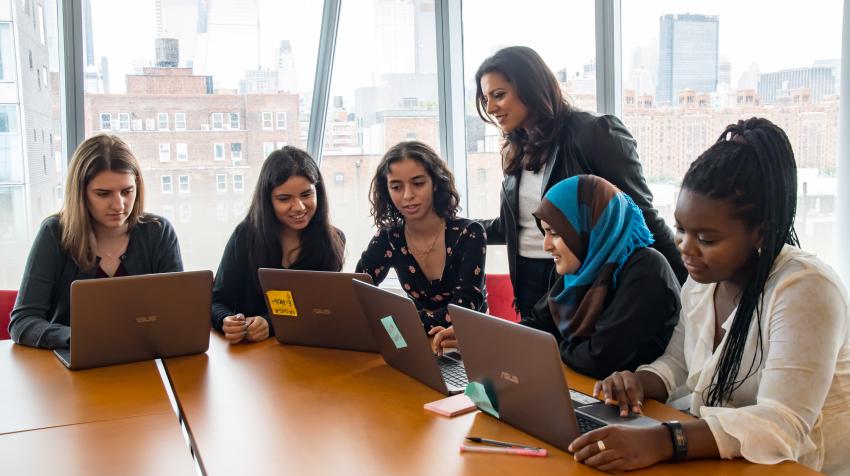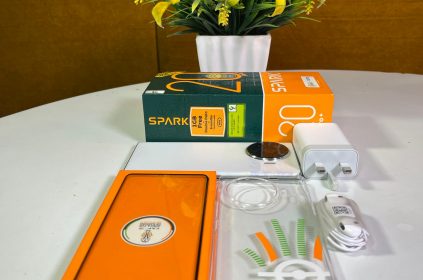Written By Onyinye Egodi
In 1889, a resolution was passed, calling for a large demonstration demanding that workers should not be forced to work beyond 8 hours a day. This became an annual event and was subsequently declared as Labour day.
May 1st is celebrated the world over as the international labour day, a day set aside to educate workers and labourers about their rights and remind employers about the importance of providing a safe working environment/space for all.
The theme of 2023 International Workers’ Day is ‘Workers’ Rights and Socioeconomic Justice’.’
It is the right of all workers in the tech space especially women to feel safe at work.
When conversations about providing a safe working environment \space for all workers comes up, special attention is often paid to women as they are the gender most likely to feel unsafe of uncomfortable in the work space.
ALSO READ: What Africa Can Teach World About Role Of Data In Education Transformation
For workers generally it may just be another public holiday when they get to rest or for some attend special seminars to talk about “the future of work”.
However, it seems like the perfect opportunity to remind everyone that the tech space is still largely male dominated and that women in this space have to carefully navigate around male bias, covert and over sexual harassment, the male ego and other work place improprieties they have to surmount to thrive and compete in the same space as their male counterparts.
In celebration of labour day, I highlight a list of issues tech companies must address in other to create a safe working environment for women in tech.
The gender bias issue
In a recent interview with women in tech, Damilola Olatunmise, founder of code school Africa talking about the bias women have to battle with in the tech space shared an experience of how she went in for a meeting with a prospective client who wanted her firm to render service but didn’t seem to think she was capable of doing based her gender.
“I once went in for a meeting alone, it was a new prospect, they set up a meeting and I didn’t think anything of it because I had gone to meeting alone in the past and everything went fine so I had no reason to think this would be any different. The client wanted to build an e-learning platform which was really my company’s forte. But as I walked in for the meeting, the person presiding said ” oh are we still waiting for someone else? I was surprised and said no we aren’t and they said so you are the one for the meeting?”
She continues to tell me how these kinds of biases have eaten deep, especially in this part of the world which isn’t a secret.
To break this bias, Tech companies should ensure that those who are in position to make the decisions are not those with bias against women to ensure they do not stifle their creativity due to ingrained gender biases.
The issue of gender disparity
Gender disparity in this instance, refers to the unequal representation for women in the tech space. It is no secret that the space is still very largely male dominated with female founded companies only recently beginning to crop up.
Asides encouraging investors to fund more female led startups, one must also encourage employers to make the extra effort to employ more women into their companies so ensure a balanced ratio of women to men in a company.
Nnenna Aja-Nwachukwu, Business Development Manager, Transport Solutions, Industry Ecosystems at Interswitch perfectly echoes this sentiment in an interview.
She doesn’t deny that there certainly is a very glaring gender disparity in the fintech space which clearly applies to the tech space as a whole not just in Nigeria but globally, a trend which she believes leads to the question of why less women seem to be coming into the space.
“ The global fintech space has a huge potential for growth but what we see is a lot of male dominance compared to female presence in the space. This is something we as women in the space have to ask what is causing that gap, how can we bridge it? female leaders face a lot of challenges in this space, from more difficulty raising funds to many times being the only woman in a board room meeting with about 10 men, I have also experienced this one time when I was on a panel with 6 males and I was the only female on the panel, I remember thinking they should have made it 3 women at least to create some sort of balance. It hit me then that there is indeed a gender disparity in the Fintech space but what hit me the most is why and most importantly what can be done about it?”.
solution to gender disparity? it’s simple. Hire more women. Include more women on your panels, thanks to the internet, we now know they exist. find them.
Create a quota system to ensure the ratio of women to men hire is balanced, this is because contrary to popular belief, women do not enjoy being the only one of their gender in a work place.
One in five women report they are often the only woman, or one of the only women, in the room at work, according to the “Women in the Workplace” report from McKinsey & Company and LeanIn.org.
The research also shows “onlies” — the only woman, are likelier to experience subtle forms of bias. About 64% of all women reported they experienced micro aggressions at work. That number jumped to nearly 90% when women frequently found themselves in “only” situations.
Women who are onlies also report feeling “on guard,” “under pressure” and “‘closely watched,” according to the report.
The sexual harassment issue
“ I would not leave out the bigotry, the condescension like who are you, the sexual harassment and advances sometimes from men who you need to sign a document and they tell you we need to have another conversation if you want your document signed or get a contract or a seat at the table.
“These things exist and are a major challenge to progression because then your solution is blocked by somebody wanting to have a different conversation than the one you are bringing to the table.”
The above statement from Sethebe Manake succinctly brings to fore the issue of sexual harassment and work place improprieties in the work environment.
Fintech unicorn Flutterwave has been in the news for these same issues, which lets us know that this is definitely an issue in the tech space.
Which begs the question, is this a safe space?
The very question Chisom of Echehiuka of Code Hub Africa posed to a young lady interested in a scholarship program in his code hub before he proceeded to make some inappropriate propositions to her.
Gbenga Agboola of flutterwave is also accused of allegedly having an inappropriate relationship with the female member’s of his staff.
Eke Urum, former RiseVest CEO, was found guilty of alleged sexual misconduct in the workplace and has since stepped down as CEO techcabal.
The Nigerian tech space it would seem struggles with inappropriate relationships with subordinates in the work place and it is important to note that most times even when these improprieties are reported, no punishment is meted out on the culprits.
They are often let off the hook with a slight tap on the wrist after they put out insincere apologies using the right buzzwords.
Conclusion
Workers rights and social economic justice would just be another title if deliberate steps are not taken to address issues that affect the gender that makes up a good portion of the workforce in the tech space.
From tech founders to developers, engineers, and women in non tech roles, these issues if addressed would go a long way in ensuring that the rights of women in the tech space are respected and protected.
Happy worker’s day!



















 and then
and then